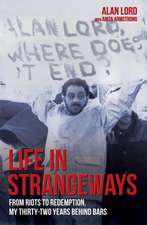Hidden Victims: The Effects of the Death Penalty on Families of the Accused: Critical Issues in Crime and Society
Autor Susan F. Sharpen Limba Engleză Paperback – 8 iun 2005
"Sharp’s book reemphasizes the tremendous costs of maintaining the death penalty—costs to real people and real families that ripple throughout generations to come."—Saundra D. Westervelt, author of Shifting the Blame: How Victimization Became a Criminal Defense
"Everyone concerned with the effects of capital punishment must have this book."—Margaret Vandiver, professor, department of criminology and criminal justice, University of Memphis
Murderers, particularly those sentenced to death, are considered by most to be unusually heinous, often sub-human, and entirely different from the rest of us. In Hidden Victims, sociologist Susan F. Sharp challenges this culturally ingrained perspective by reminding us that those individuals facing a death sentence, in addition to being murderers, are brothers or sisters, mothers or fathers, daughters or sons, relatives or friends. Through a series of vivid and in-depth interviews with families of the accused, she demonstrates how the exceptionally severe way in which we view those on death row trickles down to those with whom they are closely connected. Sharp shows how family members and friends—in effect, the indirect victims of the initial crime—experience a profoundly complicated and socially isolating grief process.
Departing from a humanist perspective from which most accounts of victims are told, Sharp makes her case from a sociological standpoint that draws out the parallel experiences and coping mechanisms of these individuals. Chapters focus on responses to sentencing, the particular structure of grieving faced by this population, execution, aftermath, wrongful conviction, family formation after conviction, and the complex situation of individuals related to both the killer and the victim.
Powerful, poignant, and intelligently written, Hidden Victims challenges all of us—regardless of which side of the death penalty you are on—to understand the economic, social, and psychological repercussions that shape the lives of the often forgotten families of death row inmates.
Murderers, particularly those sentenced to death, are considered by most to be unusually heinous, often sub-human, and entirely different from the rest of us. In Hidden Victims, sociologist Susan F. Sharp challenges this culturally ingrained perspective by reminding us that those individuals facing a death sentence, in addition to being murderers, are brothers or sisters, mothers or fathers, daughters or sons, relatives or friends. Through a series of vivid and in-depth interviews with families of the accused, she demonstrates how the exceptionally severe way in which we view those on death row trickles down to those with whom they are closely connected. Sharp shows how family members and friends—in effect, the indirect victims of the initial crime—experience a profoundly complicated and socially isolating grief process.
Departing from a humanist perspective from which most accounts of victims are told, Sharp makes her case from a sociological standpoint that draws out the parallel experiences and coping mechanisms of these individuals. Chapters focus on responses to sentencing, the particular structure of grieving faced by this population, execution, aftermath, wrongful conviction, family formation after conviction, and the complex situation of individuals related to both the killer and the victim.
Powerful, poignant, and intelligently written, Hidden Victims challenges all of us—regardless of which side of the death penalty you are on—to understand the economic, social, and psychological repercussions that shape the lives of the often forgotten families of death row inmates.
Din seria Critical Issues in Crime and Society
-
 Preț: 268.96 lei
Preț: 268.96 lei -
 Preț: 211.96 lei
Preț: 211.96 lei -
 Preț: 319.24 lei
Preț: 319.24 lei -
 Preț: 202.80 lei
Preț: 202.80 lei -
 Preț: 314.50 lei
Preț: 314.50 lei -
 Preț: 265.49 lei
Preț: 265.49 lei -
 Preț: 306.73 lei
Preț: 306.73 lei -
 Preț: 284.57 lei
Preț: 284.57 lei -
 Preț: 312.70 lei
Preț: 312.70 lei -
 Preț: 262.19 lei
Preț: 262.19 lei -
 Preț: 307.87 lei
Preț: 307.87 lei -
 Preț: 305.55 lei
Preț: 305.55 lei -
 Preț: 314.50 lei
Preț: 314.50 lei -
 Preț: 288.69 lei
Preț: 288.69 lei -
 Preț: 508.35 lei
Preț: 508.35 lei -
 Preț: 316.25 lei
Preț: 316.25 lei -
 Preț: 307.48 lei
Preț: 307.48 lei -
 Preț: 343.21 lei
Preț: 343.21 lei -
 Preț: 290.17 lei
Preț: 290.17 lei -
 Preț: 305.57 lei
Preț: 305.57 lei -
 Preț: 283.80 lei
Preț: 283.80 lei -
 Preț: 285.09 lei
Preț: 285.09 lei -
 Preț: 315.26 lei
Preț: 315.26 lei -
 Preț: 316.63 lei
Preț: 316.63 lei -
 Preț: 283.59 lei
Preț: 283.59 lei -
 Preț: 276.03 lei
Preț: 276.03 lei - 27%
 Preț: 824.73 lei
Preț: 824.73 lei -
 Preț: 338.04 lei
Preț: 338.04 lei -
 Preț: 416.71 lei
Preț: 416.71 lei -
 Preț: 290.35 lei
Preț: 290.35 lei -
 Preț: 288.59 lei
Preț: 288.59 lei - 27%
 Preț: 825.88 lei
Preț: 825.88 lei -
 Preț: 283.04 lei
Preț: 283.04 lei -
 Preț: 287.45 lei
Preț: 287.45 lei -
 Preț: 311.44 lei
Preț: 311.44 lei
Preț: 306.73 lei
Nou
Puncte Express: 460
Preț estimativ în valută:
58.70€ • 61.06$ • 48.46£
58.70€ • 61.06$ • 48.46£
Carte tipărită la comandă
Livrare economică 15-29 aprilie
Preluare comenzi: 021 569.72.76
Specificații
ISBN-13: 9780813535845
ISBN-10: 0813535840
Pagini: 248
Dimensiuni: 152 x 229 x 18 mm
Greutate: 0.34 kg
Ediția:None
Editura: Rutgers University Press
Colecția Rutgers University Press
Seria Critical Issues in Crime and Society
ISBN-10: 0813535840
Pagini: 248
Dimensiuni: 152 x 229 x 18 mm
Greutate: 0.34 kg
Ediția:None
Editura: Rutgers University Press
Colecția Rutgers University Press
Seria Critical Issues in Crime and Society
Notă biografică
SUSAN F. SHARP is David Ross Boyd Professor of Sociology and is affiliate faculty in Women’s and Gender Studies. She is also a faculty fellow with the College of Liberal Studies, the Department of Human Relations, and the Organizational Leadership Program. She received her Ph.D. in Sociology from the University of Texas-Austin in 1996. Her research focuses on female crime and deviance, the incarceration of women, and the impact of corrections policies on families of offenders. Her recent research has focused on theoretical explanations of female criminal behaviors from a life course perspective, exploring how multiple marginalities may steer women into criminal and/or deviant behaviors. She has served on the executive board of the American Society of Criminology and was the founding editor of Feminist Criminology, the official journal of the Division on Women and Crime of the American Society of Criminology.
Dr. Sharp’s current research focuses on jail diversionary programs for female offenders.
Dr. Sharp’s current research focuses on jail diversionary programs for female offenders.
Cuprins
Foreword by Michael L. Radelet
Preface
Acknowledgments
1. Introduction: The Death Penalty, Victims' Families, and Families of Prisoners
2. Dealing with the Horror: "We're Sentenced, Too": Families of Individuals Facing a Death Sentence
3. Trying to Cope: Withdrawal, Anger, and Joining
4. The Grief Process: Denial and Horror, the BADD Cycle (Bargaining, Activity, Disillusionment, and Desperation}
5. Facing the End: Families and Execution
6. Aftermath: Picking Up the Pieces
7. "But He's Innocent"
8. Double Losers: Being Both a Victim's Family Member and an Offender's Family Member
9. Family after the Fact: Fictive Kin and Death Row Marriages
10. The Death Penalty and Families, Revisited
11. Conclusion
Appendix A. Death Row Visitation Policies (Social/Family Visits)
Appendix B. Interview Schedule for Initial Interviews
Appendix C. Demographics of Interview Subjects
Notes
Bibliography
Index
Preface
Acknowledgments
1. Introduction: The Death Penalty, Victims' Families, and Families of Prisoners
2. Dealing with the Horror: "We're Sentenced, Too": Families of Individuals Facing a Death Sentence
3. Trying to Cope: Withdrawal, Anger, and Joining
4. The Grief Process: Denial and Horror, the BADD Cycle (Bargaining, Activity, Disillusionment, and Desperation}
5. Facing the End: Families and Execution
6. Aftermath: Picking Up the Pieces
7. "But He's Innocent"
8. Double Losers: Being Both a Victim's Family Member and an Offender's Family Member
9. Family after the Fact: Fictive Kin and Death Row Marriages
10. The Death Penalty and Families, Revisited
11. Conclusion
Appendix A. Death Row Visitation Policies (Social/Family Visits)
Appendix B. Interview Schedule for Initial Interviews
Appendix C. Demographics of Interview Subjects
Notes
Bibliography
Index
Descriere
"Sharp’s book reemphasizes the tremendous costs of maintaining the death penalty—costs to real people and real families that ripple throughout generations to come."—Saundra D. Westervelt, author of Shifting the Blame: How Victimization Became a Criminal Defense
"Everyone concerned with the effects of capital punishment must have this book."—Margaret Vandiver, professor, department of criminology and criminal justice, University of Memphis
Murderers, particularly those sentenced to death, are considered by most to be unusually heinous, often sub-human, and entirely different from the rest of us. In Hidden Victims, sociologist Susan F. Sharp challenges this culturally ingrained perspective by reminding us that those individuals facing a death sentence, in addition to being murderers, are brothers or sisters, mothers or fathers, daughters or sons, relatives or friends. Through a series of vivid and in-depth interviews with families of the accused, she demonstrates how the exceptionally severe way in which we view those on death row trickles down to those with whom they are closely connected. Sharp shows how family members and friends—in effect, the indirect victims of the initial crime—experience a profoundly complicated and socially isolating grief process.
Departing from a humanist perspective from which most accounts of victims are told, Sharp makes her case from a sociological standpoint that draws out the parallel experiences and coping mechanisms of these individuals. Chapters focus on responses to sentencing, the particular structure of grieving faced by this population, execution, aftermath, wrongful conviction, family formation after conviction, and the complex situation of individuals related to both the killer and the victim.
Powerful, poignant, and intelligently written, Hidden Victims challenges all of us—regardless of which side of the death penalty you are on—to understand the economic, social, and psychological repercussions that shape the lives of the often forgotten families of death row inmates.
Murderers, particularly those sentenced to death, are considered by most to be unusually heinous, often sub-human, and entirely different from the rest of us. In Hidden Victims, sociologist Susan F. Sharp challenges this culturally ingrained perspective by reminding us that those individuals facing a death sentence, in addition to being murderers, are brothers or sisters, mothers or fathers, daughters or sons, relatives or friends. Through a series of vivid and in-depth interviews with families of the accused, she demonstrates how the exceptionally severe way in which we view those on death row trickles down to those with whom they are closely connected. Sharp shows how family members and friends—in effect, the indirect victims of the initial crime—experience a profoundly complicated and socially isolating grief process.
Departing from a humanist perspective from which most accounts of victims are told, Sharp makes her case from a sociological standpoint that draws out the parallel experiences and coping mechanisms of these individuals. Chapters focus on responses to sentencing, the particular structure of grieving faced by this population, execution, aftermath, wrongful conviction, family formation after conviction, and the complex situation of individuals related to both the killer and the victim.
Powerful, poignant, and intelligently written, Hidden Victims challenges all of us—regardless of which side of the death penalty you are on—to understand the economic, social, and psychological repercussions that shape the lives of the often forgotten families of death row inmates.















